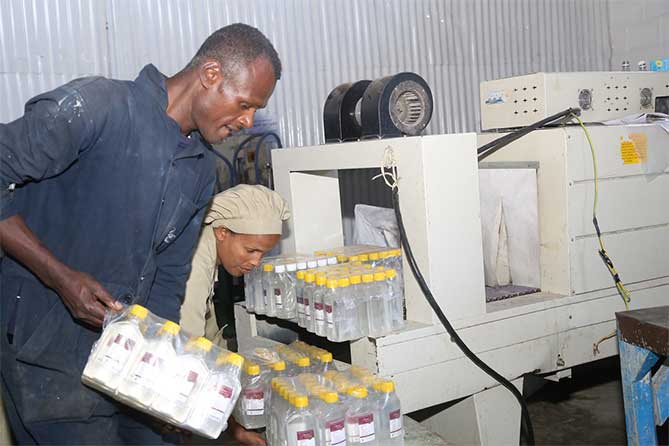
Apr 4 , 2020
By HENOK TERECHA ( FORTUNE STAFF WRITER )
 Workers package sanitizer at Ethio Asian, a soap and detergent manufacturer.
Workers package sanitizer at Ethio Asian, a soap and detergent manufacturer. The Food & Drug Authority drafted a new temporary directive that gives an exclusive license to manufacturers, enabling them to make hand sanitizer, disinfectant and face masks.
Drafted as a response to the ongoing effort of the country to ward off the potential outbreak of Novel Coronavirus (COVID-19), the directive was enacted last week. The Authority issued the six-month directive in a speedy process.
The seven-page directive is applicable to newly formed manufacturers as well as for those who are already in the business.
To secure a license, applicants should prepare a designated space for the production of these products and a place to store the manufactured products. They should also have a technical officer who holds a first degree in biology, chemistry or chemical engineering. Once the applicants fulfill all the requirements set by the directive, they will get the license within two days.
A worker at Ethio Asian, a soap and detergent manufacturer.
They are also compelled to specify the manufacturer's name and the location of the plant on product labeling.
So far, 56 manufacturers have fulfilled the requirements and secured accreditation to start producing hand sanitizer and alcohol, antiseptics and disinfectant. Twenty-six of the manufacturers were already engaged in making these and other products, while the remaining 30 requested new applications. Ethio Asian, Ethiopian Pharmaceuticals Manufacturing Factory (EPHARM), Taflen Industry & Trading, Gastrock, Sheba Pharmaceutical are among the companies that secured the license.
The directive also applies to companies that import these products. Importers of masks, hand sanitizer and gloves must also have a technical staff member that will monitor the operation. Gloves and face mask importers are required to produce a CE Marking, an international health certification, or are expected to have quality assurance documents. Hand sanitizer importers are also asked to provide the quality assurance certificates.
Face mask manufacturers, which use cloth, are expected to prove the masks can filter out bacteria and viruses. These companies are also asked to come up with an assurance certification, according to the directive.
A worker at Ethio Asian, a soap and detergent manufacturer.
The directive will remain active until the country controls the pandemic and the government makes new arrangements, according to Abera Deneke, public relations and communications director at the Authority.
If the country is able to contain the virus before the directive expires, the companies must return the licenses. If they want to continue making the products, they have to secure a new license by passing through the normal procedure. If after six months the pandemic is not contained, the companies have to renew their licenses.
Ethiopia reported the first COVID-19 cases on March 13, 2020, and the number reached 35 as of the end of last week. Out of the total number of people who have acquired the virus, three of them have fully recovered and were discharged from the treatment centres.
Ethio Asian, which normally manufactures detergent and soap, has started making hand sanitizer and disinfectant after securing the new license from the Authority. The company has already started supplying hand sanitizer to Red Cross, Ride Taxi and banks.
"We're delivering to the mass community with our vehicles," said Tasegaye Gebre, CEO at Ethio Asian, which produces 3,000lt to 4,000lt a day.
Atlaw Alemu (PhD), assistant professor at Addis Abeba University's College of Business & Economics, says the directive will play a significant role in the country’s economy by filling the gap in the supply.
"It will open a huge business for the companies that are expected to supply the products that currently have a huge demand from the public," he said.
Amsalu Molla, (MD), dean of the health college at Debre Tabor University, says the directive will make the products more accessible to consumers.
"Most of these products displayed at pharmacies are imported," he said, "so the new directive will fill this gap and provide supply to meet the demand."
PUBLISHED ON
Apr 04,2020 [ VOL
21 , NO
1040]

Radar | Mar 23,2019

Radar | Dec 11,2021

Radar | May 11,2019

Radar | May 24,2025

Fortune News | Feb 03,2024

Verbatim | Apr 06,2024

Fortune News | Aug 11,2024

Radar | Oct 05,2019

Fortune News | Jun 22,2024

Fortune News | Jul 10,2020

Dec 22 , 2024 . By TIZITA SHEWAFERAW
Charged with transforming colossal state-owned enterprises into modern and competitiv...

Aug 18 , 2024 . By AKSAH ITALO
Although predictable Yonas Zerihun's job in the ride-hailing service is not immune to...

Jul 28 , 2024 . By TIZITA SHEWAFERAW
Unhabitual, perhaps too many, Samuel Gebreyohannes, 38, used to occasionally enjoy a couple of beers at breakfast. However, he recently swit...

Jul 13 , 2024 . By AKSAH ITALO
Investors who rely on tractors, trucks, and field vehicles for commuting, transporting commodities, and f...

Jun 28 , 2025
Meseret Damtie, the assertive auditor general, has never been shy about naming names...

Jun 21 , 2025
A well-worn adage says, “Budget is not destiny, but it is direction.” Examining t...

Jun 14 , 2025
Yet again, the Horn of Africa is bracing for trouble. A region already frayed by wars...

Jun 7 , 2025
Few promises shine brighter in Addis Abeba than the pledge of a roof for every family...